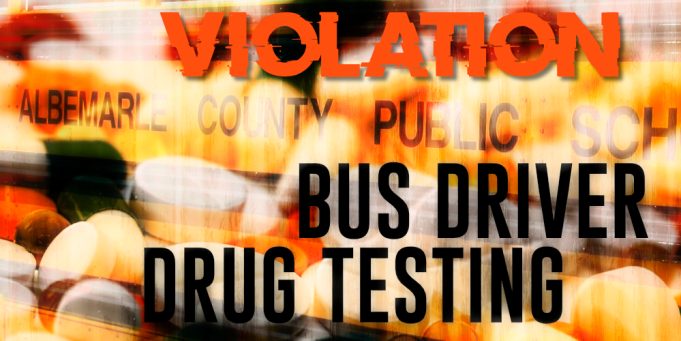Following multiple insider tips, the Schilling Show launched an investigation into Albemarle County Public Schools’ (ACPS) lack of adherence to Federal drug testing requirements for bus drivers who hold Commercial Drivers Licenses (CDL).
Federal statutes require random drug/alcohol testing for school-based CDL holders, and whistleblowers suggested that the practice had been discontinued for several years during the tenure of former ACPS transportation director, Charmane White—and had remained so following her abrupt departure.
Freedom of Information Act inquiries of ACPS yielded “no responsive records” when the Division was asked for copies of “contracts signed,” “contracts in-effect,” or “invoices paid” regarding random drug/alcohol testing during the period of January 1, 2022 through April 15, 2024.
Sources suggest that the period of delinquent random drug/alcohol testing for Albemarle County Public Schools bus drivers may have been significantly longer than the requested window would indicate.
On May 6, 2024, subsequent to the Schilling Show public records request, Deputy Director of Transportation, William Shifflett, sent a message to the ACPS “Transportation team” indicating that “the random drug and alcohol testing program will resume effective immediately,” [emphasis added] indicating that the program had been suspended within ACPS:
Subject: Random Drug Testing
From: William Shifflett
To: TransportationGood afternoon, Transportation team,
I hope this message finds you well. Following several months of work identifying a vendor, I am writing to inform you that the random drug and alcohol testing program will resume effective immediately. We anticipate a testing process to occur by the end of the school
year. As part of our commitment to maintaining a safe and productive work environment, it is imperative that we uphold our policies regarding substance use.
Random drug and alcohol testing is an essential component of our safety protocols, ensuring the well-being of all students, employees, and the integrity of our operations. By adhering to these measures, we demonstrate our dedication to maintaining a workplace that prioritizes safety and professionalism.
Please be advised that all employees with a CDL are subject to random drug and alcohol testing, and compliance is mandatory. Our van drivers will also be randomly tested. Detailed information regarding the testing procedures will be provided shortly, as required by policy. Here is a link to School Board policy GDQ, Bus Drivers, which outlines these federal requirements.
As you know, drivers are subject to pre-employment/pre-duty drug testing, reasonable suspicion alcohol and drug testing, random alcohol and drug testing, post-accident alcohol and drug testing, return-to-duty and follow-up alcohol and drug testing pursuant to procedures set out in the federal regulations. Any employee who refuses to submit to a test shall not perform or continue to perform safety-sensitive functions, and may be subject to disciplinary action, up to and including termination.
If you have any questions or concerns regarding the resumption of random drug and alcohol testing, please do not hesitate to reach out to me.
Thank you for your attention to this matter.
Regards,
William
William Shifflett
Deputy Director of Transportation
On May 14, 2024, newly appointed ACPS Director of Transportation, Jamie Gellner sent her own missive on the resumption of legally mandated drug and alcohol testing. Notably, Rosalyn Schmitt, ACPS Chief Operating Officer and immediate underling of Superintendent Matt Haas, was copied:
From: Jamie Gellner
Sent: Tuesday, May 14, 2024
To: Transportation@k12albemarle.org
Cc: Rosalyn Schmitt, Brodie Downs, Davra BruceSubject: Follow-up Details for the Random Drug and Alcohol Testing Program (long email and important for you to keep)
Good morning transportation team,
As we shared previously, the random drug and alcohol testing program will resume effective immediately. I apologize, but this will be a lengthy email that will share more information about the process that will occur as well as additional materials for you to review about this federal requirement.
Transportation will provide our vendor, currently Trident National, with a quarterly list of both CDL and non-CDL driving staff and the corresponding driver’s license number. Our vendor will randomly select a percentage of our employee pool which ensures annual testing compliance governed by the FMCSA. Along with the list of employees selected for testing, a list of alternate employees will also be selected by the vendor. This list will be used in the event a driver in the selected pool is absent. The vendor will set up a collection site / process on the second floor of VMF using the conference room and upstairs restrooms.
On the day of the test, the Dispatch office contacts those drivers that are selected. Once the driver is called, they must report immediately to the testing location, as directed. Since testing will be on site at VMF, please report to the employee lounge and notify Lisa Minter you are here by phone – Extension 12200. At the testing site, the employee needs to have their driver’s license for identification. Once at the site the driver must remain until the test is complete. The employee should sign and initial all paperwork with the lab technicians when done. Two copies of the Custody Control form will be provided to the employee.
After the specimen is collected, it is then sent to the lab for testing. The lab tests a “split specimen,” in case something happens to one of the vials, the specimen tests positive, or there is a problem with the specimen. If the specimen tests positive, the driver will be contacted by the Medical Review Officer (MRO) doctor for further evaluation. Drivers have the right to request testing of the second split specimen if the first specimen tests positive.
The actual testing time may vary due to the number of employees being tested. However, generally speaking, the testing time should be relatively brief.
If you maintain a Commercial Driver’s License the Department of Transportation requires 50% random drug testing and 10% random alcohol testing in a calendar year. All random selections are computer-generated. If you actively drive, you are automatically eligible each quarter.
Here are some specific rules about the Onsite Drug & Alcohol Testing Requirements:
- Quiet Please
*Collection site area must remain quiet to eliminate distractions allowing accurate and prompt specimen collecting. Loud talking, laughing, shouting, or crowding is prohibited in the collecting area.
- Privacy
*The collection area must allow the donor to have privacy while providing the sample. Drivers should not be in the same area while the collection process is in place. They must always wait in another designated area/room with the Designated Employer Representative until their turn.
- Driver’s License / Photo Identification required.
*If photo ID unavailable the Designated Employer Representative may provide verbal positive identification.
- Loose items (Jacket, Hat, Purse, Lighters, ChapStick, Lipstick, etc.) are not allowed into the restroom.
*You may secure these items at the collection site area or with the Employer Representative.
- The Driver must maintain visual contact of the specimen until the collection process is completed by the collector.
- Medication- *DO NOT provide this information to the collector. The Medical Review Officer/Doctor will contact you directly at the phone number you provide on the testing form if needed.
- Collections must be completed. *If this is causing an interruption with another job or appointment your Employer Representative may be able to provide you with a note stating the testing requirements.
Albemarle County is an Alcohol and Drug Free environment.
For more information click on the link School Board policy GBEA Alcohol/Drug Free Workplace. Here is a link to School Board policy GDQ, Bus Drivers, which outlines these federal requirements. And, attached here is a link to the Federal Motor Carrier Safety Administration (FMCSA) Brochure for Drivers.
Please direct any questions to Jamie or William.
Respectfully,
Jamie
Jamie Gellner
Director of Transportation
According to Gellner’s email, Federal law requires 50% of CDL holders be randomly tested for drugs and 10% of CDL holders be randomly tested for alcohol per calendar year. Since ACPS has been out of compliance with Federal drug/alcohol testing requirements for at least two years, the Division’s potential penalties and fines accrued could be substantial.
Of particular concern is that ACPS knew or should have known that the Transportation Department was severely mismanaged. As reported, the previous director was not engaged in her work and often was not present on-site—and in-division investigations rightfully ensued.
Ultimately, though, thousands of Albemarle County Public School children needlessly were placed at-risk by a distracted Superintendent (Matt Haas) who was too busy disseminating Marxist propaganda, a feckless School Board more concerned with gender confusion than student safety, and a checked-out Transportation Director who was widely suspected to be extremely under-qualified for her position.
Such is the state of Albemarle County Public Schools, and such are the risks for parents choosing to entrust children there.









Rob, you have stumbled upon something even larger than perhaps you or most others realize. Having served as both a school bus driver and school bus driver trainer in the past, I can tell you that what the Albemarle County public school system has failed to do not only has tremendous potential consequences for the students that have been getting on those buses every day all these years; it has omimous implications and reverberations that go further up the chain, all the way into the federal government. You have to ask yourself, how many people have been asleep at the switch? And why?
To fully understand and comprehend the impact of your report, let’s look at a very basic setup that applies to all school districts in the United States.
Federal Funding and Compliance
Federal Funding Overview:
School districts in the U.S. receive funding from federal, state, and local sources. Federal funds come from programs such as Title I (aimed at improving education for disadvantaged students), the Individuals with Disabilities Education Act (IDEA), and the Safe and Drug-Free Schools and Communities Act.
These funds are contingent upon compliance with federal regulations and standards. Within that subset there is of course the issue of
Transportation Funding.
Specific federal funds are allocated for transportation, including the safe and efficient transportation of students. This can and usually does include the purchase and maintenance of buses, as well as operational costs. Further, you have the Federal Requirements for Drug Testing Omnibus Transportation Employee Testing Act of 1991:
This Act mandates drug and alcohol testing for safety-sensitive transportation employees, including school bus drivers. It was enacted to ensure the safety of transportation systems.
The Act requires pre-employment testing, random testing, reasonable suspicion testing, post-accident testing, return-to-duty testing, and follow-up testing for controlled substances and alcohol.
Department of Transportation (DOT) Regulations:
The DOT, through the Federal Motor Carrier Safety Administration (FMCSA), enforces drug and alcohol testing regulations (49 CFR Part 382) for commercial drivers, including school bus drivers.
Compliance with these regulations is necessary for receiving certain types of federal funding, particularly those related to transportation and safety programs.
There-in we go to the next safety gate, the link between drug testing and Federal Funding
Compliance and Funding Eligibility:
School districts must demonstrate compliance with federal drug testing regulations to remain eligible for federal transportation funds. Non-compliance can result in the loss of these funds, which are critical for operating and maintaining school bus fleets.
Federal audits and reviews of school district transportation programs often include checks for compliance with drug and alcohol testing requirements.
Next gate, Safety and Accountability:
Ensuring that bus drivers are free from drugs and alcohol is a key component of federal safety standards. The rationale is that drug and alcohol-free drivers reduce the risk of accidents and injuries, thereby promoting a safe environment for students.
Federal funds are tied to performance metrics that include safety records and compliance with safety regulations, which include drug testing.
States are responsible for implementing and enforcing federal drug testing requirements for school bus drivers. They often have additional regulations that mirror or enhance federal requirements.
State education departments typically provide guidelines and oversight to ensure that school districts comply with these requirements.
The Kicker: Consequences of Non-Compliance:
School districts found to be non-compliant with federal drug testing regulations face penalties such as fines, increased oversight, and the potential loss of federal funds.
Non-compliance can also lead to increased insurance premiums and potential liability issues in the event of an accident involving a school bus driver under the influence of drugs or alcohol.
So what your report here has illuminated, is not only a deficiency by the former director Charmaine White, it also shows a deficiency and/or cover up or conspiracy by departments in both the Commonwealth of Virginia and within the Federal Government.
The connection between drug testing of public school bus drivers and federal funding for school districts is rooted in federal legislation aimed at ensuring safety in transportation. Compliance with these drug testing requirements is essential for school districts to receive and maintain federal funding, which supports various transportation-related needs. The enforcement of these regulations as devised and if enforced, promotes safety and accountability, thereby protecting students and ensuring the effective use of federal resources.
I cannot help but to be curious. Now that we are telling everyone it’s okay to use marijuana, and since it is so difficult to attract bus drivers, despite the substantive increase in pay, are we overlooking the obvious and gambling for expediencies sake, the lives of our children?
Is the laissez-faire attitude of the school bathroom and the school locker room now spilling behind the steering wheels of our school buses?
Excellent points, Hank.
One must now question if testing results were submitted to VA and Feds. I can’t imagine funding would occur without timely submitted results. If so, were they legitimate or false? If legitimate, where are the billing records for the testing? Who was paid and when? Charmaine shenanigans have previously occurred in ACPS Transportation (lack of vendor on-time payments)
Were fraudelent testing records submitted?